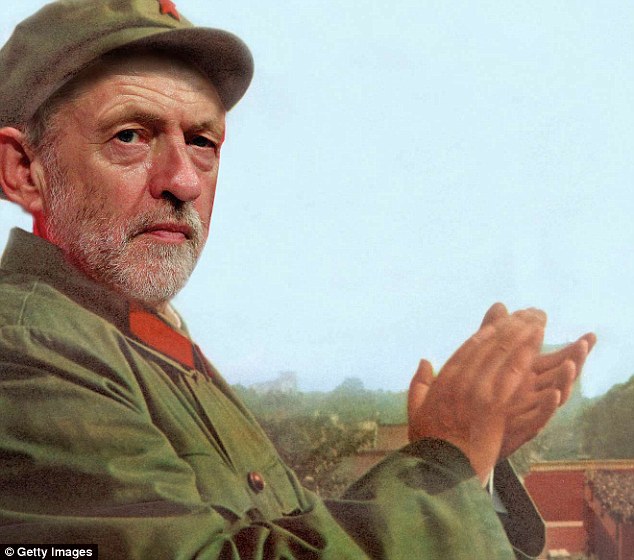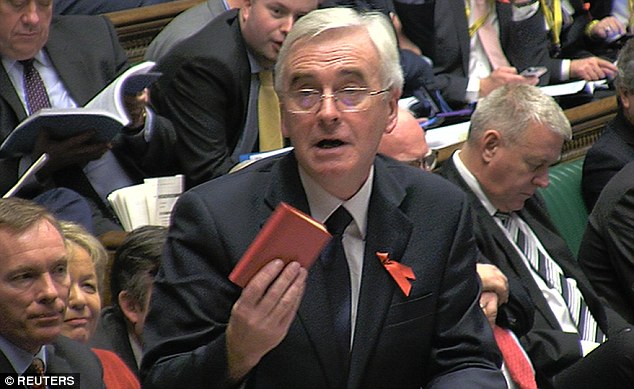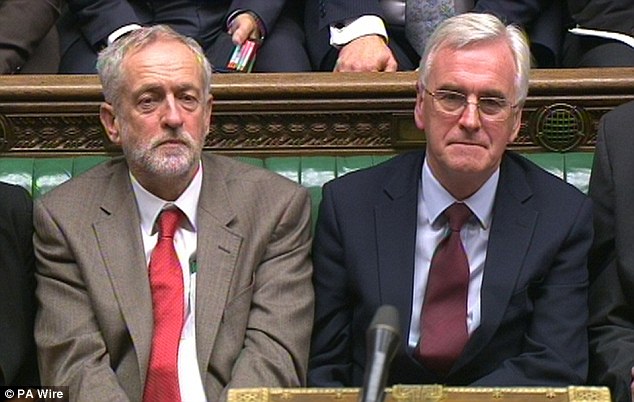| |
| |
| |
| |
The
sun rises over John McDonnell’s Britain, pale and wan. Along the fog-bound
roads leading into the capital, beneath the great glowering portraits
of the Party leadership, the bicycles stretch as far as the eye can see,
back to back in the dawn rush hour. |
| |
| |
| In
the east, as the sky lightens over the vast paddy fields, thousands of people
are trudging to work in the collective farms of the Fens. |
| |
|
| On
the re-education camps on the Isle of Man, sirens have already roused the
inmates from their short, troubled sleep, summoning them for the day’s first
socialist songs before their hard labour. |
| |
|
|
In
Trafalgar Square, where tourists gather in the shadow of Corbyn’s Column,
you can often see the foreign visitors gazing in awe at the giant posters
of Marx, Mao, Len McCluskey and Diane Abbott |
| |
|
| In
the House of the People’s Struggle Against Capitalist Oppression, formerly
known as the British Museum, caretakers are sweeping the dusty, deserted
halls, now emptied of the artefacts collected during the discredited years
of British imperialism, from the Elgin Marbles to the Rosetta Stone. |
| |
|
| Even
though there are hours until the museum opens, there is already a long,
silent queue outside. These days, schoolteachers regularly arrive with their
charges well before dawn, often camping outside in the freezing cold in
a bid to prove their socialist zeal. |
| |
|
| They
have all come to see one thing, of course. Just a few inches high and only
64 pages long, its shabby red cover marked by age, it rests in a cushion
in a glass cabinet, flanked by unsmiling Red Guards — the single most important
book in British history. |
| |
|
| Today,
every household has one. But this particular edition is special. For this
is the very copy of the Little Red Book — or to give it its formal name,
Quotations From Chairman Mao Tse-Tung — from which John McDonnell, once
the Labour Party’s Shadow Chancellor, now People’s Chancellor and Co-Author
of the Revolution, quoted in the House of Commons one November day several
years ago. |
| |
|
| Every
schoolchild knows the story. How the capitalist hyenas and imperialist running
dogs — the hated David Cameron and George Osborne — sat there roaring their
heads off after their Autumn Statement. |
| |
|
| How
the people’s hero, Comrade McDonnell, stood firm against the braying laughter
of the Tory jackals, proudly brandishing his beloved edition of Chairman
Mao’s wise words. |
| |
|
| How
the British peasant masses, roused after centuries of persection, rose as
one to salute the courage of Comrade McDonnell and his fellow toiler for
socialist liberation, Labour Party Chairman Jeremy Corbyn. |
| |
|
| And
how, after years of struggle, the heroes of the revolution at last stormed
the ramparts of capitalist greed, tore down the mansions of the money-makers,
and turned Britain into a shining temple to the wisdom of Chairman Mao. |
| |
|
| This,
at least, is the lesson drilled into Britain’s youngsters when, at the age
of three, they first arrive at their state schools, from the smallest primary
in the peasant villages to the vast experimental comprehensives at Eton
and Harrow. |
| |
|
| Even
as they eat their breakfast gruel beneath the giant portraits of Comrades
Corbyn and McDonnell, inspiring socialist hymns play from hidden loudspeakers. |
| |
|
| In
their history lessons, teachers read them colourful, inspirational stories
from Britain’s past — from the Peasants’ Revolt of 1381 to Tony Benn’s creation
of British Leyland in 1969. |
| |
|
| In
their foreign language lessons, children pore over their Mandarin textbooks,
struggling to translate passages about the golden age of Maoist China. |
| |
|
| But
it is not all joyless hard work. There is time for sport, too, and most
children look forward to their battles on the ping-pong tables, in emulation
of the national heroes who last month defeated a visiting team from North
Korea. |
| |
|
| Occasionally
there are reports of violence in some schools, usually when over-enthusiastic
pupils have denounced a particular teacher whom they suspect of secret bourgeois
leanings. |
| |
|
| By
and large, though, Britain’s children are regarded as the most docile and
disciplined in the world — which is perhaps not surprising, when you think
that they are in school for 12 hours a day, with many also fitting in Young
Socialist activities before bedtime. |
| |
| Foreign
visitors to Britain — assuming they have obtained the correct travel permissions
— often remark on the extraordinary transformation in our national life. |
| |
| In
Trafalgar Square, where tourists gather in the shadow of Corbyn’s Column,
you can often see the foreign visitors gazing in awe at the giant posters
of Marx, Mao, Len McCluskey and Diane Abbott. |
| |
|
Shadow
chancellor John McDonnell reads out Chairman Mao's Little Red Book in
the Commons |
| |
| Where
once there were advertisements for expensive capitalist luxuries such as
cars, fridges, wine and chocolates, now there are inspiring slogans, modelled
on those used in Mao’s China. |
| |
| ‘Great
Teacher, Great Leader, Great Commander, Great Helmsman,’ reads the legend
on Oxford Street’s colossal picture of the suspiciously youthful-looking
Ken Livingstone, now installed as Mayor of London for life. |
| |
| The
messages on the electronic hoardings at Piccadilly Circus, meanwhile, are
no less rousing. |
| |
| ‘Long
Live the Red Terror!’ reads one. ‘Those Who Are Against Chairman Corbyn
Will Have Their Dog Skulls Smashed Into Pieces!’ Sadly, however, the wise
words of Chairman Mao and other great Marxist thinkers are lost on some
of Britain’s more reactionary elements. |
| |
| Indeed,
for all that the government celebrates the legacy of the Revolution, there
are still those who pine for the dark days of capitalism. In the aftermath
of the Revolution, many of the old elite took refuge on the Isle of Wight,
including the Royal Family and the leaders of the Conservative Party. |
| |
| There,
from their headquarters at Osborne House — the former home of that wicked
imperial Empress, Queen Victoria — they maintain a rival British state. |
| |
| Like
the island of Taiwan during the early decades of Maoist rule in China, the
Isle of Wight still clings onto Britain’s seat at the United Nations, even
though the Corbyn regime has been working hard with major allies, such as
Russia, Iran and Venezuela, to secure UN recognition. |
| |
| In
general, though, the Maoist regime hurls invective not at the rival royalist
state, but at ‘deviationists’ and ‘running dogs’ within its own ranks. |
| |
| The
most common targets, known as the Gang of Four, are the former Labour politicians
Liz Kendall, Tristram Hunt, Stella Creasy and Alan Johnson. They fled to
the Isle of Wight soon after the Revolution — thus proving, according to
Comrade McDonnell, that they had been Tory traitors all along. |
| |
| Even
within the regime itself, there have been murmurs of disquiet. Comrade Len
McCluskey’s Great Leap Forward, which re-opened derelict mines and factories
across wide swathes of northern England, Wales and Scotland, was not quite
as popular as its author had hoped. Many people, it turned out, did not
really fancy spending their lives working down the pit. |
| |
| Although
the authorities keep a tight lid on the Press, there have been persistent
rumours of mass fatalities at some Yorkshire pits. And despite public beatings
for recalcitrant managers, targets have been missed year after year. |
| |
| From
the huge collective farms of the Fens, meanwhile, there come whispers of
dreadful suffering. In emulation of Mao’s ‘Down to the Countryside Movement’,
and to reconnect Britain with its peasant roots, the regime shipped thousands
of bright young university graduates from the cities to the wide, featureless
fields of East Anglia, which were hastily converted into gigantic rice paddies. |
| |
| But
only a few months after the first farms had opened, Comrade Abbott delivered
a much publicised speech denouncing Britain’s leading intellectuals for
what she called their ‘reactionary bourgeois revisionism’. |
| |
| So
began the first of the purges. Live on national television, well-known writers
and thinkers — Melvyn Bragg, Germaine Greer, Mary Beard, David Starkey —
were rounded up by Red Guards and driven deep into the countryside, where
they were presented with hoes and brusquely instructed to begin tilling
the land. |
| |
| The
result, naturally, was a disaster. Quite apart from the appalling death
toll among the intellectuals themselves, many of whom reportedly collapsed
with exhaustion only minutes after taking up their hoes, the Fenland collective
farms have conspicuously failed to meet the needs of Britain’s urban proletariat. |
| |
| According
to the UN, no country in the Western world suffers from greater malnutrition.
And although the government insists that last year’s famine across the vast
collective farms of the West Country was a one-off, international experts
suggest that the real picture is much more terrifying. |
| |
| Before
the mass expulsion of foreign journalists last summer, many overseas newspapers
carried reports of starving children across the south-west — from Plymouth
and Exeter to Yeovil and Dorchester. From isolated villages in Somerset
and Dorset there even came scattered rumours of cannibalism, with starving
families forced to devour elderly relatives. |
| |
| In
today’s Britain, however, to repeat such stories is to risk imprisonment,
or worse. Since the launch of the Cultural Revolution, Red Guards have been
quick to pounce on anything that smacks of satire or dissent. |
| |
| Since
‘Right Opportunists’ such as Michael McIntyre, Ian Hislop and Jeremy Clarkson
were carried off to the Isle of Man re-education camps, even to tell a joke
now carries the taint of bourgeois imperialism. |
| |
| Indeed,
in the ‘safe spaces’ of Britain’s universities, the slightest flash of humour
or intellectual dissent can sometimes be enough to guarantee a savage beating. |
| |
| In
general, however, our universities are remarkably quiet places these days.
Many students spend little time on campus; instead, they travel the country,
honouring Mao’s directive to eradicate the ‘Four Olds’ — customs, culture,
habits and ideas — from British life. |
| |
| Some
estimates suggest that as many as 3,000 churches have been vandalised or
demolished. Statues of kings, generals and prime ministers have been pulled
down in towns across the nation. |
| |
| Even
the supposedly imperialist names of places themselves, including the former
royal London borough of Kingston upon Thames and Churchill in Oxfordshire,
have been wiped off the map. |
| |
|
Labour
leader Jeremy Corbyn and shadow chancellor John McDonnell
during the debate in the House of Commons |
| |
| As
for Buckingham Palace itself, there was initially talk of converting it
into a Palace of the People, complete with a library of Marxist classics,
a waxworks display of great moments from Maoist history and a gigantic works
canteen for apparatchiks in the nearby Agriculture Ministry. |
| |
| In
recent months, however, there have been whispered stories of strange goings-on
behind the forecourt of the Palace, where Red Guards march to the sound
of the Internationale. |
| |
| Scouring
the bins, dissidents have found numerous bottles of sleeping pills and other
drugs, as well as super-sized packets of cheap Chinese cigarettes. Doctors
have been spotted coming and going regularly. There have been disturbing
reports of cars pulling into the Palace late at night, with Red Guards dragging
terrified teenage girls inside. |
| |
| And
watching after dark, some observers claim to have seen a familiar shape
moving behind the curtains — older, more hunched, but unmistakably the silhouette
of one of history’s greatest killers. |
| |
| After
seizing power in the Revolution of 1949, Mao ruled Communist China for more
than a quarter of a century. Under his aegis, more than 60 million people
died in purges, re-education camps and state-sponsored famines, making him
comfortably the biggest mass- murderer in history. |
| |
| Officially,
of course, he died in 1976, his body raddled by drug abuse, sexual excess
and a lifetime of chain-smoking. But the evidence is becoming overwhelming:
Chairman Mao is still alive and ensconced in the Queen’s bedchamber. |
| |
| And
if this sounds implausible, then just reflect that it is no more implausible
than, say, Jeremy Corbyn becoming Leader of Her Majesty’s Opposition, or
his Shadow Chancellor reading from Mao’s Little Red Book in the House of
Commons. |
| |
| Once
it would have seemed utterly unthinkable that a senior Opposition politician
— the man aspiring to manage the nation’s finances — would gleefully quote
the greatest mass killer who has ever lived, a monster of ideological tyranny
and sexual depravity whose name deserves to live in infamy. |
| |
| But
we live in strange times. Yes, Mr Corbyn once promised us a new politics.
But few of us ever expected to see Chairman Mao rising from the dead. |
| |
| |
| |
|
| |
|
| |
|
| |
Saying
which.... |
| |
|
| |
Dictatorial
socialism might be the only escape from the even more oppressive scriptoral
content and breeding habits of the world's third most popular religion! |
| |
|
| |
|
|
| |
|
| |
|
| |
|
This
Article is available from: |
| |
|
|




